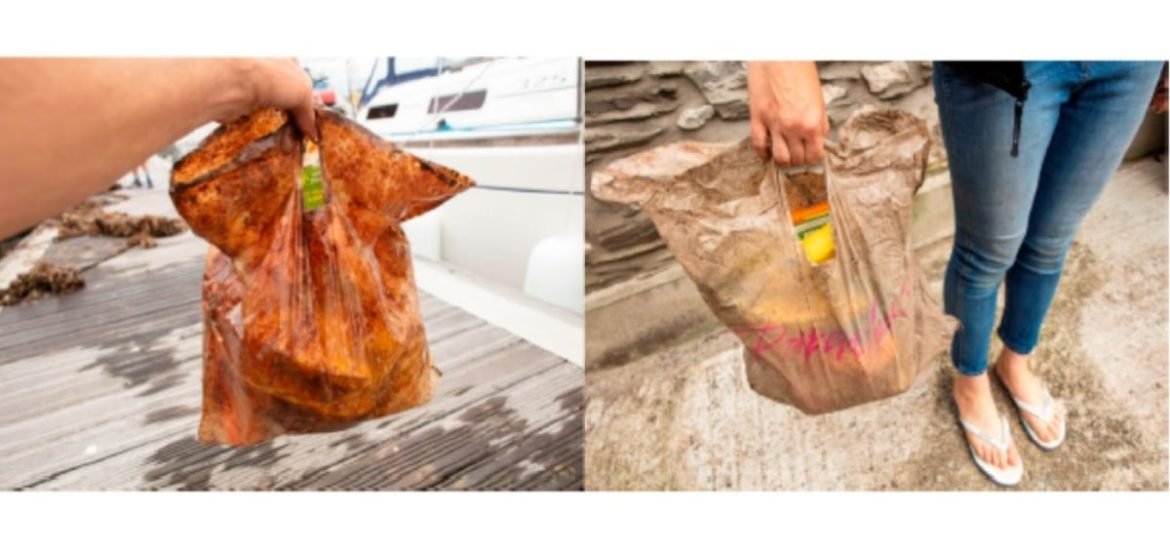
Biodegradable plastic carrier bags cannot be relied upon to degrade more quickly, according to a new study published on 28 April in Environmental Science & Technology (1). The findings suggest plastic bags labelled “biodegradable” can still accumulate in the environment, and therefore, substantially contribute to the plastic pollution problem.
More than 335 million tonnes of plastic is produced annually around the world. Around 50 per cent of this is discarded after a single use. In the EU, annual plastic bag use per capita exceeds 450 bags in some countries. Thus, plastics present a major waste management problem, write the authors.
Particularly, since a considerable portion of plastic waste ends up as litter, polluting land, oceans, and the atmosphere. Not to mention the fact that waste from consumer plastics degrade slowly over time posing serious threats to human health and animals and emitting toxic greenhouse gases into the atmosphere.
While plastic bag levies reduce plastic waste to some degree, many plastic carrier bags still make their way into the environment. Awareness of the problem has led to the development of so-called biodegradable plastics. But this has also led many to believe that these alternatives degrade more quickly than polyethylene and are, perhaps, even environmentally friendly.
For example, the manufacturers of oxo-biodegradable plastic claim the material can “biodegrade in the open environment in the same way as a leaf and leaving nothing behind – no toxic residues or fragments of plastic”.
Are biodegradable plastics better? How quickly do they really degrade?
To find out, the researchers from the International Marine Litter Research Unit at the University of Plymouth investigated five different plastic materials — biodegradable, oxo-biodegradable, compostable, and high-density polyethene (conventional plastic carrier bags) — used to make single-use carrier bags widely available on high streets in the UK.
They exposed the materials to three environments conditions typically seen by plastics once discarded: open-air, buried in the soil or submerged in the sea. Then, to assess the amount of degradation, they visually observed changes in surface area and texture, as well as tensile strength and chemical structure over a three-year period.
After 9 months, all materials exposed to open air ― including the biodegradable, oxo-biodegradable, and conventional plastics ― disintegrated into fragments; whereas, after three years in the soil and marine environments, all bags were still distinguishable and capable of performing their carrier function.
The compostable bag completely disintegrated in the marine environment but remained intact in the soil. However, it could not hold any weight without tearing.
The “degradable” label may be misleading
Do biodegradable bags have any significant advantage over conventional plastic bags?
The authors conclude that “none of the materials examined could be relied upon to deteriorate sufficiently enough to reduce the negative effects of littering on biota or aesthetics across all three environments.”
“Moreover, it was not clear that materials which claimed to have enhanced degradation consistently deteriorated faster than conventional polyethylene”.
The findings raise serious questions about what the term biodegradable really means. The researchers, therefore, call for improved standards, such as the ISO, European Norm, and American Society for Testing and Materials (ASTM) International standards, relating to degradable plastic products – or perhaps, alternative disposal pathways.
Although, the real solution may be to simply move away from plastic materials altogether.
(1) Napper, I.E. et al. Environmental Deterioration of Biodegradable, Oxo-biodegradable, Compostable, and Conventional Plastic Carrier Bags in the Sea, Soil, and Open-Air Over a 3-Year Period. Environmental Science & Technology (2019). DOI: 10.1021/acs.est.8b06984
Image: Oxo-biodegradable bags submerged in the marine environment (left) or buried in soil (right) for over three years. Napper, I.E. and Thompson, R.C., 2019.